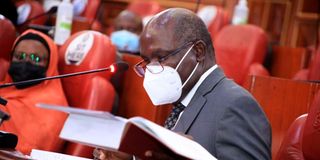Chebukati deals blow to BBI proposal

IEBC Chairman Wafula Chebukati making his submissions before the joint legal committees of the Senate and National Assembly on the Constitution of Kenya (Amendment) Bill, 2020, on March 17, 2021.
What you need to know:
- Chebukati said committee should have restricted itself to determining the number of new constituencies to be created.
- Country may face a constitutional crisis in delimiting the boundaries of the proposed constituencies.
The electoral commission yesterday said it was illegal for the Building Bridges Initiative Steering Committee to allocate the proposed 70 new constituencies to 28 out of the 47 counties, dealing a fresh blow to supporters of BBI being championed by President Kenyatta and ODM leader Raila Odinga.
Independent Electoral and Boundaries Commission (IEBC) chairman Wafula Chebukati said the Steering Committee should have restricted itself to determining the number of new constituencies to be created, but should not have assigned the same to counties as is the case in the Constitution of Kenya (Amendment) Bill, 2020.
Speaking during the public hearing on the Bill, Mr Chebukati further warned the country faces a possible constitutional crisis in delimiting the boundaries of the proposed constituencies should the Bill be enacted into law as the six months window provided is too short a time.
“If passed as it is, the Bill will contradict the Constitution, thereby presenting possible legal challenges to the delimitation process,” Mr Chebukati said when he gave his views to the joint committee of Justice and Legal Affairs of the two Houses.
“It is our view that the role of allocating any proposed additional constituencies be left to the commission as has been the case in other delimitation processes.”
Population dynamics
The IEBC issued the warning as it emerged that it doesn’t have data on population dynamics of all the 290 constituencies and 1,450 wards in the country, further raising questions on its capacity to start the process of delimiting the boundaries as required by law.
The absence of the data is a result of the turf war between the commission and the Kenya National Bureau of Statistics on where such information should be domiciled.
On the issue of data on electoral units, KNBS Director-General McDonald George Obudho said the information is available but its validation has been undermined by the refusal by the commission to provide the bureau with files to complete the process.
“We’ve tried hard to get the information on the files from IEBC from 2019. There are many correspondences over this issue. In fact the CS Treasury has convened meetings, but all these efforts have not been enough to convince the IEBC to surrender the files,” Mr Obudho said.
While the information has been collected during the 2019 National Housing and Population Census, the DG told the committee boundary issues touching on the wards have held back the validation.
The statistics bureau thus wants the commission to surrender shape files — digital maps — so that it can get information on electoral units.
Political boundaries
However, Mr Chebukati declared that no such information will be passed to the bureau as it amounts to the commission ceding its responsibility to the bureau.
“The power to delimit political boundaries is vested in the IEBC and we shall not cede the mandate to any agency,” he said. He wondered why KNBS wants primary information from the IEBC.
“Do they want to execute our mandate?”
Article 88 (4) (c) of the Constitution gives IEBC powers to delimit constituencies and wards, while Article 89 elaborates the process the commission should use in creating new electoral units.
In particular, Article 89 (4) provides that, If a General Election is to be held within 12 months after the completion of a review by the commission, the new boundaries shall not take effect for purposes of that election.
The Bill that has gone through the first reading in the two Houses, proposes creation of 70 new constituencies, bringing the total number of constituencies in Kenya to 360 from the current 290.





